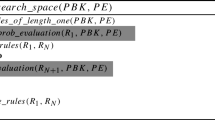Abstract
In most real-world applications the choice of the right representation language represents a fundamental issue, since it may give opportunities for generalization and make inductive reasoning computationally easier or harder. While the setting of First Order Logic (FOL) is the most suitable one to model the multi-relational data of real and complex domains, on the other hand it puts the question of the computational complexity of the knowledge induction that represents a challenge for multi-relational data mining algorithms. Indeed, the complexity of most real domains, in which a lot of relationships are required to model the objects involved, calls for both an efficient and effective search method for exploring the space of candidate solutions and a deduction procedure assessing the validity of the discovered knowledge. A way of tackling the complexity of such domains is to use a method that reformulates a multi-relational learning task into an attribute-value one. In this paper we propose an approximate reasoning technique that decreases the complexity of a relational problem changing both the language and the inference operation used for the deduction. The complexity of the FOL language is decreased by means of a stochastic propositionalization method, while the NP-completeness of the deduction is tackled using an approximate query evaluation. The induction is performed with an anytime algorithm, implemented by a population based method, able to efficiently extract knowledge from structured data in form of complete FOL definitions. The validity of the proposed technique has been proved making an empirical evaluation on a real-world dataset.
Preview
Unable to display preview. Download preview PDF.
Similar content being viewed by others
References
Zilberstein, S., Russell, S.: Approximate reasoning using anytime algorithms. Imprecise and Approximate Computation 318, 43–62 (1995)
Raedt, L.D.: Attribute value learning versus inductive logic programming: The missing links (extended abstract). In: Page, D. (ed.) ILP 1998. LNCS, vol. 1446, pp. 1–8. Springer, Heidelberg (1998)
Boddy, M., Dean, T.L.: Deliberation scheduling for problem solving in time-constrained environments. Artificial Intelligence 67(2), 245–285 (1994)
Lavrac, N., Dzeroski, S., Grobelnik, M.: Learning nonrecursive definitions of relations with linus. In: Proceedings of the European Working Session on Machine Learning, pp. 265–281. Springer, Heidelberg (1991)
Lavrac, N., Dzeroski, S.: Inductive Logic Programming: Techniques and Applications. Ellis Horwood, New York (1994)
Krogel, M.-A., Rawles, S., Zelezny, F., Flach, P., Lavrac, N., Wrobel, S.: Comparative evaluation of approaches to propositionalization. In: Horváth, T., Yamamoto, A. (eds.) ILP 2003. LNCS (LNAI), vol. 2835, pp. 194–217. Springer, Heidelberg (2003)
Lavrač, N., Železný, F., Flach, P.A.: RSD: Relational subgroup discovery through first-order feature construction. In: Matwin, S., Sammut, C. (eds.) ILP 2002. LNCS (LNAI), vol. 2583, pp. 149–165. Springer, Heidelberg (2003)
Sebag, M., Rouveirol, C.: Induction of maximally general clauses consistent with integrity constraints. In: Wrobel, S. (ed.) Proceedings of the 4th International Workshop on Inductive Logic Programming. GMD-Studien, vol. 237, pp. 195–216. Gesellschaft für Mathematik und Datenverarbeitung MBH (1994)
Zucker, J.-D., Ganascia, J.-G.: Representation changes for efficient learning in structural domains. In: Proceedings of 13th International Conference on Machine Learning, pp. 543–551. Morgan Kaufmann, San Francisco (1996)
Alphonse, E., Rouveirol, C.: Lazy propositionalization for relational learning. In: Horn, W. (ed.) Proc. of the 14th European Conference on Artificial Intelligence, pp. 256–260. IOS Press, Amsterdam (2000)
Dietterich, T., Lathrop, R., Lozano-Perez, T.: Solving the multiple instance problem with axis-parallel rectangles. Artificial Intelligence 89(1-2), 31–71 (1997)
Sebag, M., Rouveirol, C.: Tractable induction and classification in first order logic via stochastic matching. In: 15th International Join Conference on Artificial Intelligence, pp. 888–893. Morgan Kaufmann, San Francisco (1997)
Alphonse, E., Matwin, S.: A dynamic approach to dimensionality reduction in relational learning. In: Hacid, M.-S., Raś, Z.W., Zighed, D.A., Kodratoff, Y. (eds.) ISMIS 2002. LNCS (LNAI), vol. 2366, pp. 255–264. Springer, Heidelberg (2002)
Ullman, J.D.: Principles of Database and Knowledge-Base Systems, vol. I. Computer Science Press (1988)
Bratko, I.: Prolog programming for artificial intelligence, 3rd edn. Addison-Wesley Longman Publishing Co., Amsterdam (2001)
Muggleton, S., De Raedt, L.: Inductive logic programming: Theory and methods. Journal of Logic Programming 19/20, 629–679 (1994)
Srinivasan, A., Muggleton, S., King, R.D.: Comparing the use of background knowledge by inductive logic programming systems. In: Raedt, L.D. (ed.) Proceedings of the 5th International Workshop on Inductive Logic Programming, pp. 199–230. Springer, Heidelberg (1995)
Muggleton, S.: Inverse Entailment and Progol. New Generation Computing, Special issue on Inductive Logic Programming 13(3-4), 245–286 (1995)
Author information
Authors and Affiliations
Editor information
Editors and Affiliations
Rights and permissions
Copyright information
© 2008 Springer-Verlag Berlin Heidelberg
About this paper
Cite this paper
Di Mauro, N., Basile, T.M.A., Ferilli, S., Esposito, F. (2008). Approximate Reasoning for Efficient Anytime Induction from Relational Knowledge Bases. In: Greco, S., Lukasiewicz, T. (eds) Scalable Uncertainty Management. SUM 2008. Lecture Notes in Computer Science(), vol 5291. Springer, Berlin, Heidelberg. https://doi.org/10.1007/978-3-540-87993-0_14
Download citation
DOI: https://doi.org/10.1007/978-3-540-87993-0_14
Publisher Name: Springer, Berlin, Heidelberg
Print ISBN: 978-3-540-87992-3
Online ISBN: 978-3-540-87993-0
eBook Packages: Computer ScienceComputer Science (R0)




